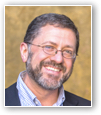Mama Said
- MIKE AQUILINA
Mama said there'd be days like this.

|
You know the days I'm talking about. You've shelled out a significant portion of your income for a major appliance. It's delivered to your door, and it doesn't work. Then you spend a week or so on the phone trying, unsuccessfully, to talk to the folks who were only too eager to take your call before they cashed your check.
My mother has a way of dealing with these problems when they come her children's way. The source of our troubles, she surmises, is malnutrition. (You've heard about the famine in Pittsburgh?) So she cooks for us — delights from millennia of Sicilian tradition, in quantities larger than a regiment would need.
Mom knows how to console her seven children, now all grown and flown from the nest. But consolation isn't everything we need, and she knows that too, so it's hardly all she dispenses. I know, for example, that she would probably take me to task for the way I'm fuming at the helpless customer serv ice representative on the other end of the phone and for the way I'm fuming about his employer when I slam down the receiver. As a matter of fact, my mother would have something to say about the way I slam down the receiver.
The late great Catholic physician Herbert Ratner meditated deeply on how God makes mothers for loving. "The focal length of the newborn's vision," he once wrote, "... is about nine inches, a measure that approximates the distance from the baby at the breast to the mother's eyes and face." The female voice is pitched high to match precisely the sensitivity of a newborn's hearing.
And my mother has always lived by the words she prayed with us and taught us. Today, when I see a Marian image, it fades into the image of my mom. In spending so much time together, Mary and Mom have begun to look alike.
Theologian Father William Virtue, a disciple of Dr. Ratner, refers to motherhood as "a lay priesthood." The mother, he says, is the first to mediate God's goodness to the child. Our mothers' milk, smiles and lullabies are our first intimations of God's providence and his love.
Saint Augustine wrote that the deepest human desire is to look upon one who looks back in love. This is the gift God gives us from the beginning, but little by little, in increments and in longing. The gift will be fulfilled perfectly in heaven.
Anyone who has known a mother's love can come to see why our heavenly Father gave us all a common mother in the Blessed Virgin Mary. The truth of Mary's love for me was among the earliest lessons I learned from my mom. While I was an infant at the breast, I'm sure, I learned the cadence of the rosary. In time I would sort out the words of the Hail Mary, the Memorare, the Angelus, the Hail, Holy Queen.
And my mother has always lived by the words she prayed with us and taught us. Today, when I see a Marian image, it fades into the image of my mom. In spending so much time together, Mary and Mom have begun to look alike.
"Whoever does not receive the kingdom of God like a child," our Savior tells us, "shall not enter it" (Mark 10:15). We need to recognize once again our helplessness amid the contradictions of life — the failed appliances and what not — and we need to relearn the precious limits we had as babies: to look upward to find peace and to see no further than our mother's face.
 This is Meaghen Gonzalez, Editor of CERC. I hope you appreciated this piece. We curate these articles especially for believers like you.
This is Meaghen Gonzalez, Editor of CERC. I hope you appreciated this piece. We curate these articles especially for believers like you.
Please show your appreciation by making a $3 donation. CERC is entirely reader supported.

Acknowledgement
 Mike Aquilina. "Mama Said." chapter six from Love in the Little Things: Tales of Family Life (Cincinnati, OH: Servant Books, 2007): 16-18.
Mike Aquilina. "Mama Said." chapter six from Love in the Little Things: Tales of Family Life (Cincinnati, OH: Servant Books, 2007): 16-18.
Reprinted with permission of Servant Books, an imprint of St. Anthony Messenger Press, and of the author, Mike Aquilina.
The Author

 Mike Aquilina is vice president of the St. Paul Center for Biblical Theology. He is the author or co-author of fifty books including A History of the Church in 100 Objects, Seven Revolutions: How Christianity Changed the World and Can Change It Again, Yours is the Church: How Catholicism Shapes Our World, Good Pope, Bad Pope: Their Lives, Our Lessons, Love in the Little Things: Tales of Family Life, Living the Mysteries: A Guide for Unfinished Christians, Fathers of the Church: An Introduction to the First Christian Teachers, The Way of the Fathers: Praying with the Early Christians, and Praying in the Presence of Our Lord: With St. Thomas Aquinas. With Cardinal Donald Wuerl, he is the author of The Church: Unlocking the Secrets to the Places Catholics Call Home, and The Mass: The Glory, the Mystery, the Tradition. See Mike Aquilina's "The Way of the Fathers" blog here.
Mike Aquilina is vice president of the St. Paul Center for Biblical Theology. He is the author or co-author of fifty books including A History of the Church in 100 Objects, Seven Revolutions: How Christianity Changed the World and Can Change It Again, Yours is the Church: How Catholicism Shapes Our World, Good Pope, Bad Pope: Their Lives, Our Lessons, Love in the Little Things: Tales of Family Life, Living the Mysteries: A Guide for Unfinished Christians, Fathers of the Church: An Introduction to the First Christian Teachers, The Way of the Fathers: Praying with the Early Christians, and Praying in the Presence of Our Lord: With St. Thomas Aquinas. With Cardinal Donald Wuerl, he is the author of The Church: Unlocking the Secrets to the Places Catholics Call Home, and The Mass: The Glory, the Mystery, the Tradition. See Mike Aquilina's "The Way of the Fathers" blog here.




